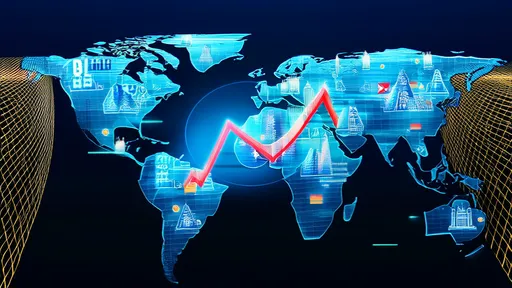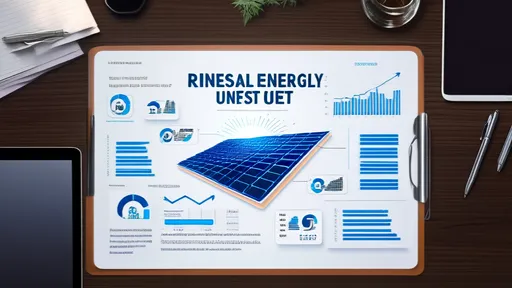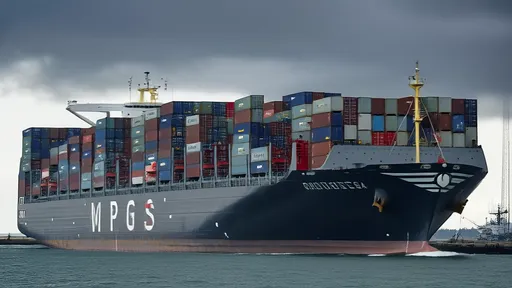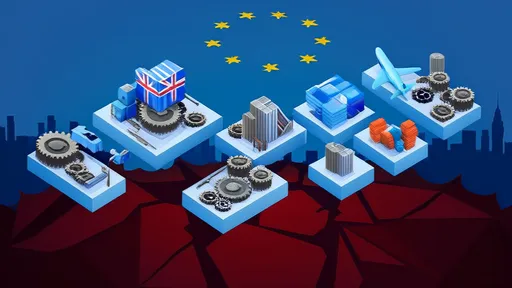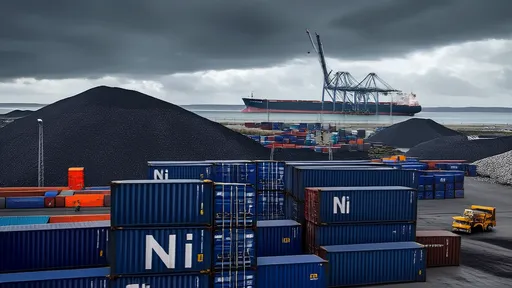The once-explosive growth of cross-border e-commerce is showing signs of cooling, prompting major platforms to shift their focus toward emerging markets, particularly Southeast Asia. After years of double-digit expansion, global online retail sales are facing headwinds from economic uncertainty, supply chain disruptions, and shifting consumer behaviors. This slowdown has forced industry players to rethink their strategies, with many turning their attention to the relatively untapped potential of Southeast Asian nations.
Southeast Asia's digital economy has become the new battleground for e-commerce giants seeking sustainable growth. With a combined population exceeding 650 million and internet penetration rates climbing steadily, the region presents a compelling opportunity. Countries like Indonesia, Vietnam, and the Philippines are experiencing rapid urbanization and a burgeoning middle class eager to embrace online shopping. Unlike more mature markets where growth has plateaued, Southeast Asia offers the promise of expansion reminiscent of China's e-commerce boom a decade ago.
The competition among platforms has intensified remarkably in recent months. Established players like Alibaba's Lazada and Sea Group's Shopee are being challenged by newcomers such as TikTok Shop and Temu, creating a dynamic and sometimes chaotic marketplace. Local partnerships have become crucial in this environment, with international platforms rushing to form alliances with regional payment providers, logistics companies, and social media influencers. This land grab mentality reflects the strategic importance platforms are placing on establishing early dominance in what they view as the next major e-commerce frontier.
Consumer behavior in Southeast Asia differs significantly from Western markets, presenting both opportunities and challenges for cross-border sellers. Mobile-first shopping habits, preference for cash-on-delivery payments, and the influence of social commerce require platforms to adapt their approaches. Live-stream shopping events, which gained popularity in China, are now being aggressively promoted across Southeast Asia with localized content and regional celebrities. The cultural diversity across the region also means that successful platforms must navigate varying preferences, languages, and shopping festivals unique to each country.
Infrastructure limitations remain a significant hurdle despite the market's potential. Last-mile delivery challenges, underdeveloped digital payment ecosystems in some countries, and complex customs regulations continue to test the patience of both platforms and consumers. However, these obstacles are gradually being overcome through massive investments in logistics networks and fintech solutions. The platforms that can effectively address these pain points while maintaining competitive pricing and product selection are likely to emerge as long-term winners in the regional e-commerce race.
The current slowdown in global cross-border e-commerce growth has paradoxically accelerated investment and innovation in Southeast Asia. As platforms face saturation in their traditional markets, the pressure to establish footholds in high-potential emerging economies has never been greater. This fierce competition benefits Southeast Asian consumers through improved services, better prices, and more choices, while forcing platforms to develop more sustainable and locally-adapted business models. The coming years will reveal whether this gold rush mentality leads to lasting success or another cycle of consolidation as the market matures.
The World Trade Organization (WTO) has issued a stark warning about the growing fragmentation of global trade, cautioning that a breakdown in international cooperation could slash global GDP by up to 5%. The alarm comes amid rising geopolitical tensions, trade barriers, and a shift toward protectionist policies that threaten to unravel decades of economic integration.
The global food price index has shown a steady decline over the past several months, offering temporary relief to consumers worldwide. However, this positive trend masks deeper structural vulnerabilities in the world's food systems that continue to threaten long-term food security. While lower prices at grocery stores and markets provide welcome breathing room for household budgets, agricultural experts warn that climate change remains an existential threat to stable food production.
The once-explosive growth of cross-border e-commerce is showing signs of cooling, prompting major platforms to shift their focus toward emerging markets, particularly Southeast Asia. After years of double-digit expansion, global online retail sales are facing headwinds from economic uncertainty, supply chain disruptions, and shifting consumer behaviors. This slowdown has forced industry players to rethink their strategies, with many turning their attention to the relatively untapped potential of Southeast Asian nations.
The race for quantum supremacy has entered a new phase as tech giants IBM and Google accelerate their efforts to commercialize quantum computing. What was once a theoretical pursuit confined to research labs is now a high-stakes battle for market dominance, with both companies vying to establish themselves as the leader in this transformative technology. The competition is heating up as breakthroughs occur at an unprecedented pace, leaving investors, governments, and industries scrambling to understand the implications.
The global housing market, once a bastion of stability and growth, is now facing one of its most significant downturns in recent memory. Across Europe and North America, property prices have plummeted by an average of 15%, sending shockwaves through economies and leaving homeowners, investors, and policymakers scrambling to respond. This sharp decline marks the bursting of what many analysts had long warned was an unsustainable real estate bubble, inflated by years of cheap credit, speculative buying, and artificially low interest rates.
The global luxury market is experiencing an unexpected chill, and nowhere is this shift more pronounced than in China. As international luxury houses report softening demand from their most crucial demographic, a quiet revolution is taking place among Chinese consumers who are increasingly turning to homegrown high-end brands. This tectonic shift in consumer behavior is reshaping the luxury landscape in ways that few industry analysts predicted just five years ago.
The global semiconductor shortage that has plagued industries from automotive to consumer electronics since 2020 is finally showing signs of easing. However, beneath this broader recovery lies a paradoxical imbalance: while advanced chip production has largely stabilized, mature-node semiconductors remain stubbornly constrained. This divergence reveals fundamental shifts in the semiconductor ecosystem that may reshape supply chains for years to come.
The global energy landscape is undergoing a seismic shift as investments in renewable energy have surpassed those in fossil fuels for the first time in history. This milestone marks a turning point in the world’s transition toward cleaner energy sources, with solar power emerging as the dominant force driving this growth. The trend reflects not only changing market dynamics but also a broader recognition of the urgent need to combat climate change.
The biotech sector is witnessing an unprecedented surge in investor interest, with gene-editing companies leading the charge. Over the past year, venture capital firms and institutional investors have poured record-breaking sums into startups specializing in CRISPR and other gene-editing technologies. The momentum shows no signs of slowing down, as breakthroughs in therapeutic applications and agricultural innovations continue to capture both scientific and financial attention.
The global artificial intelligence (AI) investment landscape is undergoing a seismic shift, with projections indicating that total spending on AI technologies will surpass $1.5 trillion by 2025. Among the key players driving this unprecedented growth, China stands out as a dominant force, accounting for an estimated 35% of the worldwide AI investment. This surge reflects not only the rapid adoption of AI across industries but also the strategic prioritization of AI development by governments and corporations alike.
The global shipping industry is facing unprecedented turbulence as freight rates skyrocket and the Red Sea crisis exacerbates supply chain disruptions. What began as regional geopolitical tensions has spiraled into a worldwide logistical nightmare, squeezing businesses already struggling with post-pandemic recovery. The ripple effects are being felt across industries, from automotive manufacturers waiting on critical components to retailers staring at half-empty shelves during peak shopping seasons.
The UK's post-Brexit economic landscape continues to face significant headwinds, with recent data revealing a record-high trade deficit and persistent contraction in the manufacturing sector. These developments have reignited debates about the long-term consequences of leaving the European Union, as British businesses struggle to adapt to new trade barriers and supply chain disruptions.
The African Continental Free Trade Area (AfCFTA) has officially commenced operations, marking a historic milestone in the continent's economic integration. With the ambitious goal of doubling intra-African trade by 2035, the initiative is poised to reshape the economic landscape of Africa, fostering greater collaboration among its 54 member states. The AfCFTA represents the world's largest free trade area by the number of participating countries, covering a market of over 1.3 billion people and a combined GDP of approximately $3.4 trillion.
The Philippines and the United States have recently inked a pivotal agreement aimed at strengthening cooperation in the critical minerals sector, a move widely interpreted as an effort to reduce reliance on China. This strategic partnership underscores the growing geopolitical significance of securing supply chains for minerals essential to modern technology, renewable energy, and defense systems. As tensions between Washington and Beijing continue to escalate, the deal signals a broader shift in global trade dynamics, with nations increasingly seeking alternatives to Chinese dominance in the critical minerals market.
The global electric vehicle (EV) industry is facing a significant cost surge as Indonesia, the world’s largest nickel producer, enforces a strict ban on nickel ore exports. The policy, initially introduced in 2020 to promote domestic processing, has now begun to exert intense pressure on battery manufacturers scrambling to secure alternative sources. With nickel being a critical component in lithium-ion batteries, the restriction has disrupted supply chains and driven up production costs for EV makers worldwide.
